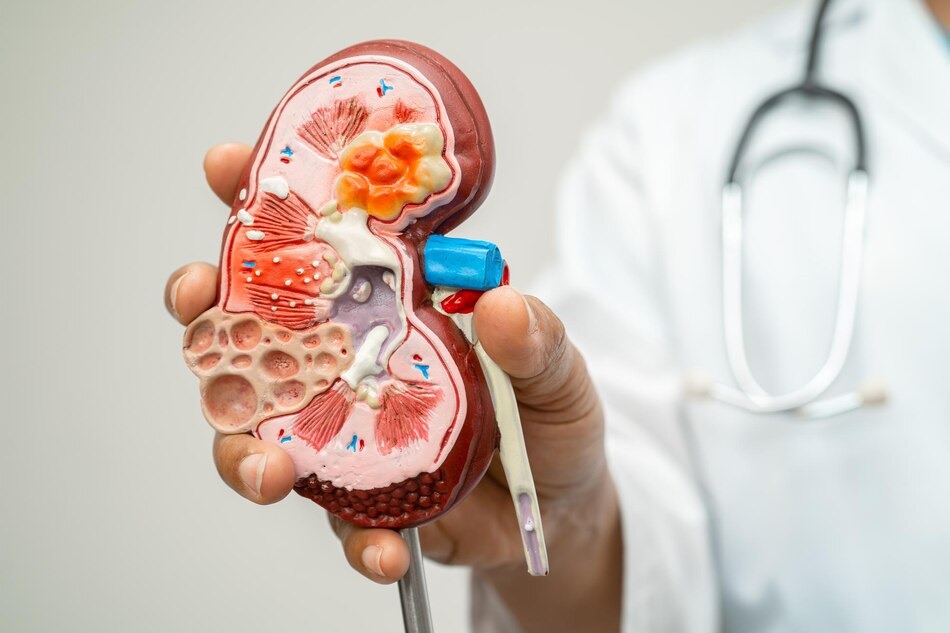Often promoted by health experts as the key to glowing skin and weight loss, proper hydration is also crucial for maintaining a healthy urinary system. Drinking water helps the kidneys remove waste through urine and keeps blood vessels open, allowing blood to flow more easily and deliver important nutrients to the kidneys.
Severe, prolonged dehydration can cause irreversible kidney damage, which can lead to diminished kidney function and even kidney failure showing multiple kidney infection symptoms.
What is the connection between hydration and kidney infection?
The kidneys’ main functions in the body are waste removal and fluid balance management. They clean the blood by filtering out waste products like excess sodium and urea, which are then removed through urine. Producing urine is a detailed process, with the kidneys generating about 1-2 liters of urine each day to filter approximately 180-200 liters of blood. It is essential for the body’s overall functioning.
What are the signs that indicate dehydration?
Dehydration can range from mild to severe, with each level causing different symptoms along with several causes of dehydration. Mild dehydration, which is a common cause of heat exhaustion, can lead to symptoms such as:
- Severe thirst
- Muscle cramps
- Not urinating frequently
- Fatigue
- Headaches
- Constipation
What are the signs of severe dehydration?
- Decreased urine output
- Bloody stool
- Dizziness
- Low blood pressure
The good news is that mild to moderate dehydration can be easily fixed by drinking more fluids, with water being the best option. However, severe dehydration needs medical attention because it can harm kidney function, raise the risk of painful kidney infection, and even lead to kidney infection.
Can dehydration affect kidney function?
Mild dehydration can disrupt normal body functions, causing fatigue or a headache. If dehydration becomes severe and lasts for a long time, it can lead to electrolyte imbalances, kidney problems like kidney failure and kidney infection, and heart issues such as heat stroke.
What are the risks of dehydration on kidney health?
Damaged kidney health:
Staying properly hydrated is crucial for keeping your kidneys working well. When you’re dehydrated, your kidneys must work harder to remove waste and toxins. Prolonged dehydration can raise the risk of kidney infection, urinary tract infections (UTIs), and even kidney damage over time. Drinking enough water helps your kidneys function better and lowers the chances of urinary problems. Seek kidney infection treatment in Coimbatore when you are dealing with kidney related issues.
High chance of UTIs:
Your risk of urinary tract infections (UTIs) may increase if you are dehydrated. When you’re dehydrated, your urine becomes more concentrated, which creates a good environment for bacteria to grow. This raises the chances of developing UTIs, which can cause discomfort, pain while urinating, frequent urination, and even fever. Staying hydrated helps flush out bacteria and lowers the risk of UTIs.
Urinary retention and constipation:
When you’re dehydrated, your body works to conserve water by drawing more fluid from waste products. This can make stools harder and increase the risk of constipation. Straining during bowel movements puts pressure on the bladder and urethra, which can cause urinary retention and incomplete bladder emptying. Staying hydrated is important for regular bowel movements and preventing urinary retention.
Irritation of the bladder:
Dehydration can irritate the bladder lining, causing discomfort and a stronger urge to urinate. Also, concentrated urine can irritate the bladder’s sensitive tissues, worsening symptoms like urgency, frequent urination, and bladder spasms. Drinking enough fluids helps keep the bladder functioning properly and reduces irritation.
Kidney stone:
Dehydration is a key contributor to the formation of kidney stones. When you don’t drink enough fluids, urine becomes concentrated, allowing minerals and salts to crystallize and form stones in the kidneys. Staying hydrated helps dilute the urine, reducing the risk of kidney stones and promoting good urinary health.
Painful bladder syndrome:
Also known as interstitial cystitis (IC), painful bladder syndrome is caused by a range of conditions, including autoimmune disorders, allergies, and vascular diseases. When a healthy bladder fills up, it swells and uses the pelvic nerves to communicate with the brain, alerting you when it’s time to urinate. In people with IC, these signals become mixed up, leading to the need to urinate more often and in smaller amounts than usual.
What are the tips to stay hydrated?
- For men, the recommended daily fluid intake is about 15.5 cups of water, while for women, it’s 11.5 cups, with more needed if you exercise regularly.
- Whether you start or end your day with a glass of water (perhaps keeping a bottle by your bed), making drinking water a habit is a good idea.
- Drinking water with every meal can help establish this routine and is an easy way to stay hydrated.
- Many water bottles have measurements on the side. Challenge yourself to drink at least the amount recommended by health experts.
- If water isn’t your preferred drink, try adding a slice of lemon or fresh fruit to make it more enjoyable.
- If you feel hungry, try drinking 8 oz of water first, as thirst is often mistaken for hunger. Plus, drinking water can help you feel fuller, which is helpful if you’re trying to lose weight.
Important Takeaway:
Dehydration can seriously affect urinary health, leading to problems like reduced kidney function, a higher risk of UTIs and kidney infection, bladder irritation, and constipation. To avoid these issues, stay hydrated, keep an eye on your urine color, eat foods that help with hydration, and be cautious with drinks that act as diuretics. Talk to the best kidney specialist in Coimbatore in case you are facing any kidney related issues. Pay attention to your body, stay in cool, shaded areas, and replenish electrolytes when needed. Stay hydrated, stay healthy, and enjoy a summer of good urinary health.


